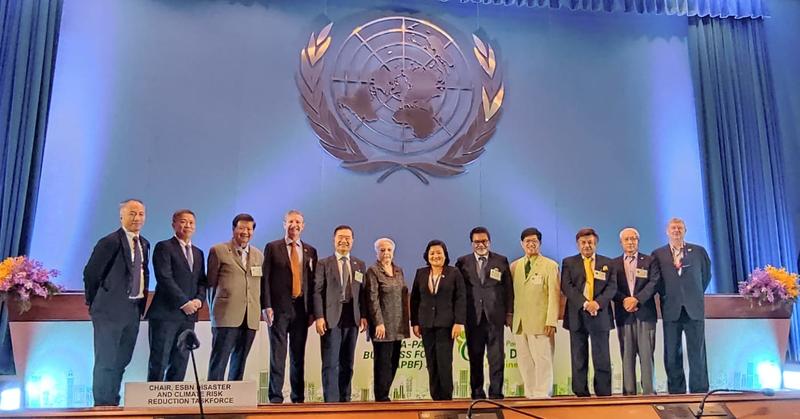 United Nations Under-Secretary-General and ESCAP Executive Secretary Armida Salsiah Alisjahbana speaks at the Asia-Pacific Business Forum 2022 in Bangkok. The conference was co-hosted by the United Nations Economic and Social Commission for Asia and the Pacific (ESCAP) and the ESCAP Sustainable Business Network. (PHOTO PROVIDED TO CHINA DAILY)
United Nations Under-Secretary-General and ESCAP Executive Secretary Armida Salsiah Alisjahbana speaks at the Asia-Pacific Business Forum 2022 in Bangkok. The conference was co-hosted by the United Nations Economic and Social Commission for Asia and the Pacific (ESCAP) and the ESCAP Sustainable Business Network. (PHOTO PROVIDED TO CHINA DAILY)
The Asia-Pacific Green Deal for Business adopted at the Asia-Pacific Business Forum 2022 in Bangkok is expected to facilitate regional players in ecological friendly businesses.
Government and business leaders from across the region adopted the decration on Friday at forum, which was co-hosted by the United Nations Economic and Social Commission for Asia and the Pacific (ESCAP) and the ESCAP Sustainable Business Network (ESBN).
The Green Deal for Business encourages companies to go greener, work to decarbonize both their own operations as well as those of their supply chains, change towards a more circular economy to minimize waste, and to build smart, water-efficient and climate-resilient cities for the shared future of humanity
The Green Deal for Business encourages companies to go greener, work to decarbonize both their own operations as well as those of their supply chains, change towards a more circular economy to minimize waste, and to build smart, water-efficient and climate-resilient cities for the shared future of humanity.
Government and business leaders from across the region have declared their support for the deal as they realize its role in countering climate change, according to a UNESCAP press release.
ALSO READ: Asia-Pacific needs clean oceans to stay afloat
Highlighting the urgent need to redouble efforts to regain the momentum to achieve the Sustainable Development Goals (SDGs), United Nations Under-Secretary-General and ESCAP Executive Secretary Armida Salsiah Alisjahbana called for coordinated efforts by governments and the private sector.
“The crisis has shown that the region needs to invest in its health infrastructure, address the digital divide and improve trade, transport and energy connectivity,” said Alisjahbana.
She added that that inflationary pressures and a surge in prices of agricultural commodities and energy are challenging post-pandemic recovery efforts, particularly in developing countries, where high food and energy prices could push many into poverty.
George Lam, Chair of ESBN and President of the Hong Kong-ASEAN Economic Cooperation Foundation, said: “From the COVID-19 pandemic, we must build back better, together and that means investing in smarter, greener solutions to further develop the Green Economy. I urge businesses to wholeheartedly adopt and implement the new Asia-Pacific Green Deal for Business through taking specific actions towards achieving the 2030 Agenda for Sustainable Development."
ALSO READ: Make climate part of the anti-virus fight
Delegates at this year’s forum also explored how business innovation, new technologies and new industries could be harnessed in pursuit of a new green economy, according to Albert Oung, Executive Council Member and Green Economy Task Force Chair of UNESCAP Sustainable Business Network.
“The digital economy will be important for green policies,” said Arkhom Termpittayapaisith, Minister of Finance of Thailand, adding that the digital transformation can significantly reduce internal and external costs, and promote green innovation such as smart city development.
 Speakers at the Asia-Pacific Business Forum 2022 pose for a group photo on Aug 26, 2022, when the Asia-Pacific Green Deal for Business was adopted. (PHOTO PROVIDED TO CHINA DAILY)
Speakers at the Asia-Pacific Business Forum 2022 pose for a group photo on Aug 26, 2022, when the Asia-Pacific Green Deal for Business was adopted. (PHOTO PROVIDED TO CHINA DAILY)
“We need to bring onboard the private sector to deal with climate change in a meaningful way. Without the private sector significantly reducing emissions, we will not meet any of the global climate plans. The private sector is also ultimately the source of most solutions - it’s the private sector that can innovate, create green products and finance green investments,” said John Denton, Secretary-General of the International Chamber of Commerce.
The Asia-Pacific Business Forum has been held annually since 2004 and invites governments, businesses, civil society and academics from all over the region to dialogue and identify innovative solutions and recommendations for the private sector to better contribute to greener and more sustainable development.
This year’s APBF urges businesses across Asia-Pacific region to sign up to the Green Deal for Business Declaration to demonstrate that businesses must take a leading role in the green transformation towards a low carbon, climate-resilient and sustainable new economy.
READ MORE: UN: Asia-Pacific 'may lose US$172b' as virus disrupts trade


